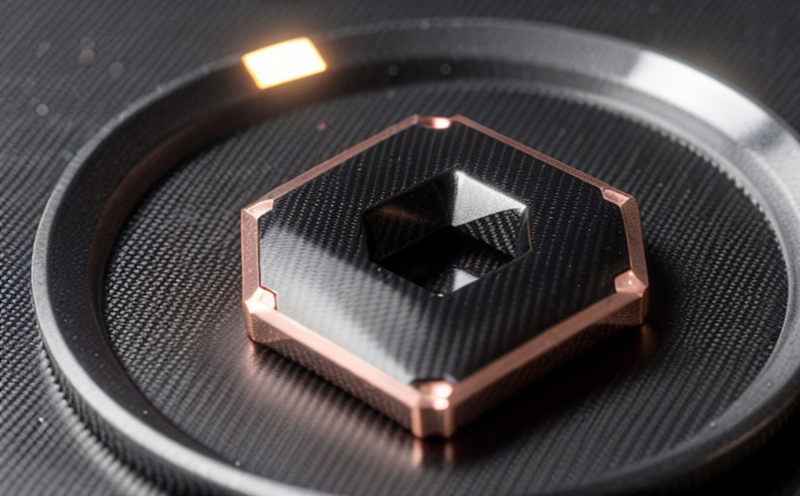ISO 2812 Chemical Resistance Testing of Graphene Surface Treatments
The ISO 2812 standard provides a framework for assessing the chemical resistance of graphene surface treatments. This service is critical in ensuring that graphene-based materials meet stringent quality and safety standards, particularly in sectors like electronics, aerospace, automotive, and energy storage.
Graphene's unique properties make it an ideal candidate for various applications, but these advantages also present challenges related to stability under chemical exposure. Surface treatments can enhance the performance of graphene by improving its compatibility with other materials or providing additional functional benefits. However, ensuring that these treatments do not compromise the integrity of the graphene is essential.
The ISO 2812 testing process involves subjecting graphene samples to a series of chemical challenges designed to mimic real-world exposure conditions. This includes immersion in different solvents and acid/alkali solutions for varying durations. The goal is to evaluate how well the surface treatment holds up against chemical degradation, ensuring that it maintains its desired properties.
During specimen preparation, graphene samples are carefully selected based on their intended application. They are then treated with specific chemicals according to the ISO 2812 protocol before undergoing rigorous testing. The instrumentation used includes advanced analytical techniques such as Scanning Electron Microscopy (SEM), Transmission Electron Microscopy (TEM), X-ray Photoelectron Spectroscopy (XPS), and Fourier Transform Infrared Spectroscopy (FTIR).
The test results are meticulously analyzed, providing insights into the chemical stability of graphene surface treatments. These analyses help determine whether the treatment has successfully protected the graphene from degradation or if further modifications are necessary.
Our laboratory adheres strictly to ISO 2812 guidelines throughout every stage of the testing process. Our experienced team ensures that all samples are handled with utmost care and precision, using state-of-the-art equipment to deliver accurate results consistently.
This service is particularly valuable for quality managers, compliance officers, R&D engineers, and procurement professionals who need assurance that graphene surface treatments meet rigorous international standards.
By leveraging ISO 2812 chemical resistance testing, organizations can optimize their use of graphene in various industries while minimizing potential risks associated with material degradation.
Applied Standards
| Standard Reference | Description |
|---|---|
| ISO 2812:2015 | This standard specifies the procedures for determining the resistance of graphene surface treatments to chemical attack. |
| ASTM D7693-14 | American Society for Testing and Materials standard that complements ISO 2812 by providing additional insights into graphene behavior under different conditions. |
The combination of these standards ensures comprehensive evaluation, allowing us to provide precise and reliable results.
Industry Applications
| Application Area | Description |
|---|---|
| Electronics | Incorporating graphene into electronic devices requires ensuring its stability against various chemicals used in manufacturing processes. |
| Aerospace | The unique properties of graphene make it suitable for lightweight, high-strength components. Testing ensures that surface treatments enhance these qualities without compromising safety. |
| Automotive | Enhancing fuel efficiency and reducing emissions through advanced materials like graphene requires thorough testing to validate the effectiveness of applied treatments. |
| Energy Storage | The development of more efficient batteries relies on robust surface treatments that maintain their integrity under harsh chemical environments. |
Our expertise in ISO 2812 chemical resistance testing helps ensure the reliability and performance of graphene-based products across these diverse sectors.
International Acceptance and Recognition
The ISO 2812 standard has gained widespread recognition among industry leaders due to its rigorous approach to evaluating graphene surface treatments. Compliance with this standard demonstrates a commitment to quality and safety, which is increasingly important as the use of graphene expands.
Many leading companies in the fields of electronics, aerospace, automotive, and energy storage have adopted ISO 2812 testing as part of their quality control processes. By adhering to these internationally recognized standards, businesses can ensure that their products meet high-quality benchmarks, thereby gaining competitive advantages in global markets.
The growing acceptance of this standard underscores its significance in the broader context of nanotechnology and materials science. As research into graphene continues, so too does the importance of ensuring that surface treatments remain effective under various chemical exposures.





